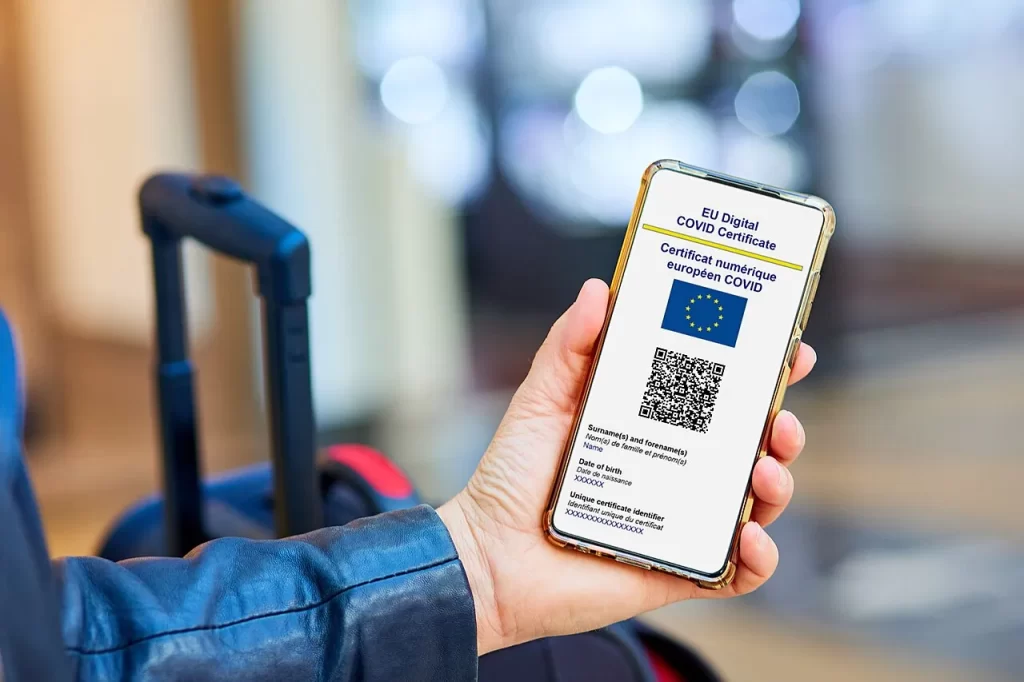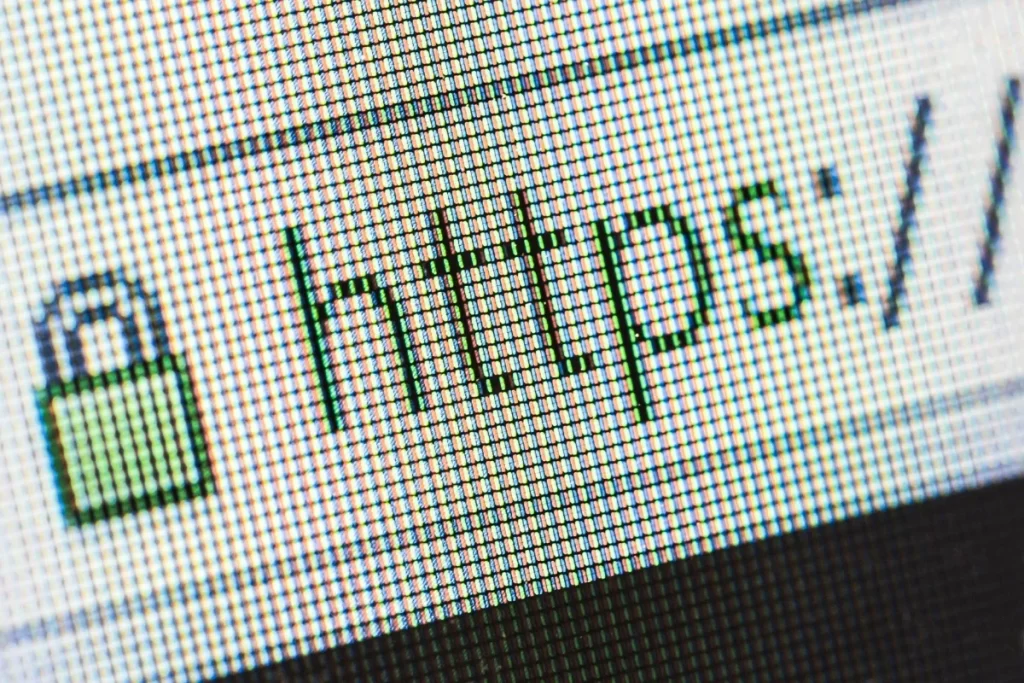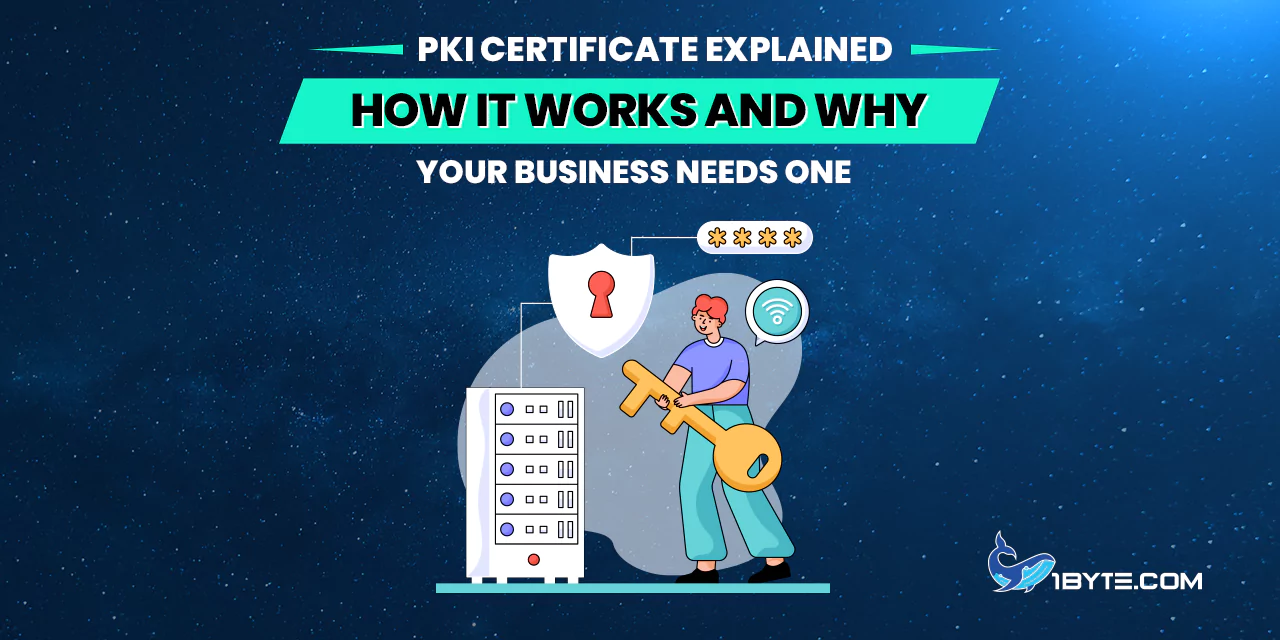Public key infrastructure (PKI) certificates are the digital backbone of internet security. A PKI certificate binds an entity’s identity (like a website or device) to a cryptographic public key, allowing secure, encrypted connections. In practice, SSL/TLS certificates on websites are PKI certificates under the hood. Today they are everywhere: a recent analysis found nearly 300 million SSL/TLS certificates active on the web as of January 2025. That vast number shows how common and critical PKI certificates have become for online trust and data protection.
A PKI certificate works like a digital ID card. It includes the holder, identifying information and the signature of a trusted certificate authority (CA). The browser or app of a user, when connecting to a server, verifies this signature with a list of trusted CAs. When the signature is valid, and the certificate is up to date, the browser secures the connection and the data can be transferred safely. To put it in simple terms, a PKI certificate is a demonstration that a public key is a part of a certain organization or user. It does not allow the interception and imitation of sensitive services by an imposter.
For example, during an HTTPS session the server’s PKI certificate lets the client encrypt data in transit so attackers cannot read it. Without a certificate, an attacker could “sniff” unencrypted HTTP traffic and steal credentials or personal data. As one source explains, installing a valid SSL/TLS certificate “lets you add transport layer security … to your otherwise insecure HTTP connection”. This encryption is vital: Google’s transparency data shows about 95% of global web traffic is encrypted (HTTPS). Browsers and users now expect this protection as standard. In fact, researchers note that Firefox reports 80%+ of websites use HTTPS, and Google sees 95% of its own traffic secured.
Read this article from 1Byte to find out more.
What Is a PKI Certificate?
A PKI certificate (also called a digital certificate) is an electronic document used to authenticate identities on the internet. It contains the public key and information about the owner of the key (the subject), and information about the issuing CA. A device or a user can check the digital signature of the CA when a certificate is met. In case the CA is trusted, the identity data and the public key are accepted. The device is then able to encrypt data or check signatures using the public key. Technically, the PKI is based on X.509 certificate format. Every PKI certificate has an expiration date and may contain data like the organization name or domain. Significantly, the signature by the CA (and frequently by intermediate certificates to a trusted root) forms a chain of trust which can be verified by browsers and clients. This chain verifies that only certificates that are issued by a recognized authority (such as DigiCert, Let’s Encrypt, or a company’s own CA) are accepted.

In everyday terms, a PKI certificate is what tells your web browser “this site really is example.com, verified by a trusted CA, so go ahead and show the green padlock icon.” It is also applied in a variety of other cases (email, VPN login, software signing, etc.) to encrypt communications. Without a certificate, there is no secure handshake and there is no encrypted channel. This is why any serious business site or application should have one: it stops data leakage, and it helps to create a customer trust.
How PKI Certificates Work
PKI relies on asymmetric cryptography. Each participant (a server, user or a device) possesses a key pair which is a public key (distributed in the certificate) and a private key (which is held in secret). When you connect to a service using the TLS/SSL, the server transmits its certificate to the client. The client verifies the validity of the certificate (dates, trusted issuer, domain name). After the verification, the client and server take part in a TLS handshake to settle on a secret session key. In this handshake, the server demonstrates that it possesses the private key to the public key in the certificate (usually by signing a portion of the handshake). When all is okay, all the data thereafter is encrypted using strong symmetric keys. This is done to make sure that eavesdroppers cannot break the encryption to decrypt the data (which is computationally infeasible).
In effect, the certificate jump-starts a secure channel. As an example, a web browser notices the certificate and automatically creates an encrypted HTTPS connection. The user observes a padlock, as he or she knows the identity of the site. One of the guides to the PKI states that in the absence of a valid SSL/TLS certificate, bad guys might intercept your plaintext data in transit. Digital signatures are also possible with PKI: a server or a user may sign documents or messages using his/her private key, and others may verify them using the public key in the certificate. This offers authenticity and integrity (e.g. code signing certificates show that software is not modified). All in all, PKI works in the background of most secure applications to manage the encryption and authentication without any disruptions.
Key Uses of PKI Certificates for Businesses

PKI certificates support a wide range of security needs. The most familiar use is securing websites and web services (SSL/TLS). But there are many others:
- Website and Application Security (HTTPS): Any business with an online presence needs an SSL/TLS certificate. This encrypts customer data (logins, payments, form data) and validates the website’s identity. For example, when a user visits a store site, the padlock icon and HTTPS indicate the site presented a valid PKI certificate. Embedding a certificate prevents attackers from stealing sensitive data in transit. The image below shows Amazon.com’s browser certificate panel as an example: the browser reports “Connection is secure” and displays the site’s certificate issued by DigiCert.
- Digital Identity Validation: Certificates can also carry business identity information. Depending on the validation level (DV/OV/EV), a certificate can tell customers whether the site is legitimately operated by your organization. For example, Extended Validation (EV) certificates display the company name in the browser, enhancing trust. In any case, every valid certificate vouches that “this domain belongs to us,” so customers know they aren’t on a spoofed site.
- User and Device Authentication: PKI allows organizations to authenticate employees and devices without passwords. Companies can issue client certificates to each employee’s laptop, smartphone, or even USB security token. When a certificate is required to log in (to Wi-Fi, VPN, or intranet), attackers can’t reuse stolen passwords or easily phish the certificate. Industry reports note a shift in attacker methods: many intruders now enter systems using compromised credentials. Public key authentication bypasses this risk by relying on certificates. For example, PKI-based Wi-Fi (EAP-TLS) forces devices to present certificates instead of a password, foiling common “evil twin” or man-in-the-middle attacks. Similarly, VPN clients can use a client certificate for login. All of these cases remove the password from the picture, which experts agree are vulnerable to phishing and theft. In short, certificate-based login ensures only authorized, authenticated users and devices can connect to your systems.
- Email and Document Security: PKI underpins email encryption (S/MIME) and digital signatures. A company can issue S/MIME certificates so that executives’ emails are automatically encrypted to each other and digitally signed. This stops interception and verifies sender identity. Unfortunately, adoption of email certificates is still very low – one analysis found only about 5.5% of users have implemented email signing/encryption certificates. That leaves many businesses exposed to phishing and data leaks. However, when used, email certificates provide a “secure envelope” and signature for corporate communications. They also allow signing PDFs and internal documents, proving authenticity. For example, medical records or contracts can be signed with a certificate so recipients know they are intact. In regulated industries (healthcare, finance, government), signed documents and encrypted emails are often required or recommended by policy and law.
- Compliance and Regulatory Requirements: Many standards and regulations implicitly require encryption and strong authentication. For instance, HIPAA (healthcare), PCI DSS (payment cards), and GDPR (data protection) all emphasize protecting data-in-transit. Certificates are the de-facto method for that. By using TLS certificates for all web and email traffic, a business demonstrates compliance best practices. In fact, guidelines from NIST and others explicitly recommend TLS for secure communication channels. A 2025 HIPAA update notes that implementing NIST-compliant encryption (such as TLS for transit) contributes to recognized security frameworks. Likewise, certificate-based authentication (e.g. PIV/CAC cards in government, or device certificates in enterprise MDM) is often part of formal security guidance.
- IoT and Machine Certificates: With the growth of Internet of Things (IoT), each device often needs its own identity. PKI allows every sensor, printer, or embedded controller to have a unique certificate. This ensures that devices authenticate securely to cloud services or control systems. Major tech players and standards (like AWS IoT, Azure IoT Hub, or NIST for edge computing) rely on PKI for device identity. In practice, issuing per-device certificates lets machines prove they are genuine and that their telemetry is trustworthy. Without PKI, securing millions of devices would be nearly impossible.
- Code Signing: Software companies use PKI certificates to sign their code and executables. This tells users (and operating systems) that the software comes from a verified source and hasn’t been altered. While not directly a business customer-facing feature, code signing protects your company’s brand and end users. For example, an update to company software that isn’t code-signed will often be blocked by Windows or browsers as “untrusted.”
In summary, PKI certificates underpin countless security functions in any modern business environment. They encrypt data, verify identities, and automate trust. Each certificate is a small investment (often only a few dollars per year) with big returns: avoiding breaches, downtime, and legal penalties.
Market Trends and Business Case
The use and importance of PKI certificates is growing rapidly. Industry reports show an explosion in certificate volume and adoption: one survey found that “enterprises need to manage 43% more certificates year-over-year”. In fact, many large organizations now handle tens of thousands of certificates. As one report notes, “the typical enterprise…now manages more than 50,000 certificates”. Managing so many keys manually is daunting. The same study found that two-thirds of enterprises had experienced service outages due to certificates expiring unexpectedly. About 25% of organizations saw five or six such outages in just six months. These incidents are costly: a 2025 DigiCert survey reports that 45% of companies had downtime from certificate issues in the past year, with 37.5% blaming expired certificates. The financial impact can be significant – one-third of affected organizations lost between $50,000 and $250,000 from certificate-related failures, and 18.5% lost even more. Clearly, failure to manage PKI can damage revenue and reputation.
This demand is driving market growth. Analysts project the global PKI (certificate authority) market to expand from about USD 5.8 billion in 2024 to over USD 24 billion by 2032 (around 20% CAGR). In practice, this means more companies buying certificates for web servers, IoT devices, email encryption, and the like. Compliance mandates (like new EU Digital Operational Resilience Act rules on crypto assets, or browser-driven limits on certificate lifetimes) are pushing businesses to modernize their PKI too. Surveys also show C-suite concern: 62% of security leaders cited “customer trust” and 61% “regulatory compliance” as top worries related to certificate management. In short, digital trust has become a board-level issue.
For any business, these trends imply urgency. As encryption becomes the norm (upwards of 90-95% of all web traffic), having no or a misconfigured PKI certificate means falling behind industry standards. It can lead to browsers warning customers, search-engine rankings dropping, or outright blocking of services. On the other hand, properly managed PKI (often with automation) prevents preventable outages and builds customer confidence. As the DigiCert report concludes, PKI “lies at the heart of nearly every aspect of technology,” and “PKI automation” is becoming essential as certificate counts explode.
Leverage 1Byte’s strong cloud computing expertise to boost your business in a big way
1Byte provides complete domain registration services that include dedicated support staff, educated customer care, reasonable costs, as well as a domain price search tool.
Elevate your online security with 1Byte's SSL Service. Unparalleled protection, seamless integration, and peace of mind for your digital journey.
No matter the cloud server package you pick, you can rely on 1Byte for dependability, privacy, security, and a stress-free experience that is essential for successful businesses.
Choosing us as your shared hosting provider allows you to get excellent value for your money while enjoying the same level of quality and functionality as more expensive options.
Through highly flexible programs, 1Byte's cutting-edge cloud hosting gives great solutions to small and medium-sized businesses faster, more securely, and at reduced costs.
Stay ahead of the competition with 1Byte's innovative WordPress hosting services. Our feature-rich plans and unmatched reliability ensure your website stands out and delivers an unforgettable user experience.
As an official AWS Partner, one of our primary responsibilities is to assist businesses in modernizing their operations and make the most of their journeys to the cloud with AWS.
Conclusion
In modern digital business, PKI certificates are not optional extras – they are fundamental. Every secure website, email, VPN, IoT device, and code signature uses some form of PKI. These certificates enable encryption, authenticate identities, and establish trust among users and systems. The evidence is clear: nearly all internet traffic is now encrypted and protected by certificates, and companies that mismanage their PKI risk costly outages and lost trust. By investing in proper PKI certificates (and automated lifecycle management), a business ensures compliance with regulations, protection against eavesdropping and impersonation, and confidence for customers. In short, a PKI certificate is the digital ID and guard of your online assets – without it, secure e-commerce, private communications, and safe authentication simply cannot happen.

